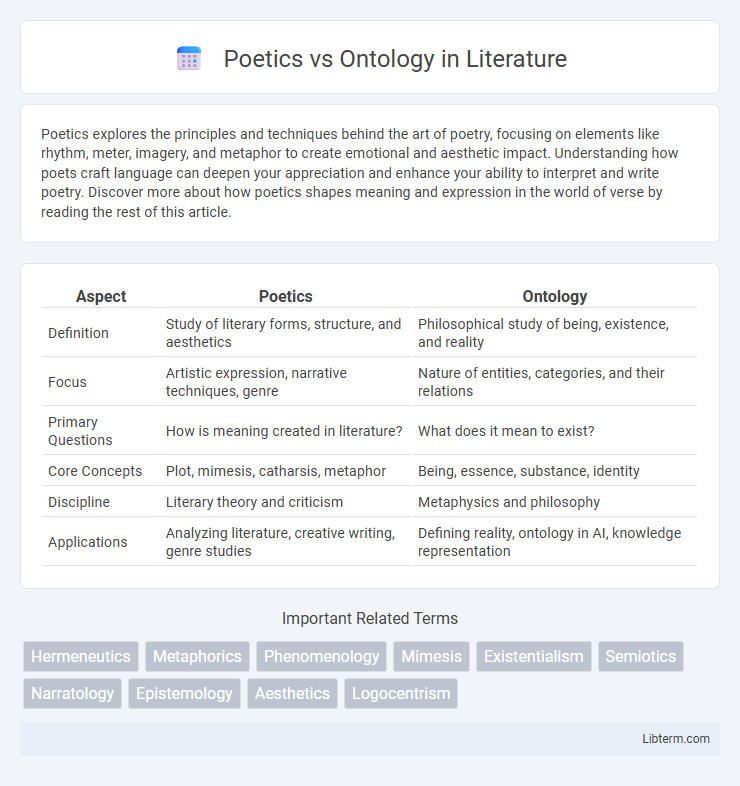Poetics explores the principles and techniques behind the art of poetry, focusing on elements like rhythm, meter, imagery, and metaphor to create emotional and aesthetic impact. Understanding how poets craft language can deepen your appreciation and enhance your ability to interpret and write poetry. Discover more about how poetics shapes meaning and expression in the world of verse by reading the rest of this article.
Table of Comparison
| Aspect | Poetics | Ontology |
|---|---|---|
| Definition | Study of literary forms, structure, and aesthetics | Philosophical study of being, existence, and reality |
| Focus | Artistic expression, narrative techniques, genre | Nature of entities, categories, and their relations |
| Primary Questions | How is meaning created in literature? | What does it mean to exist? |
| Core Concepts | Plot, mimesis, catharsis, metaphor | Being, essence, substance, identity |
| Discipline | Literary theory and criticism | Metaphysics and philosophy |
| Applications | Analyzing literature, creative writing, genre studies | Defining reality, ontology in AI, knowledge representation |
Defining Poetics: Artistry and Expression
Poetics centers on the craftsmanship and expressive techniques that shape artistic works, emphasizing narrative structure, stylistic choices, and emotional resonance. It explores how meaning and aesthetic value arise through language, symbols, and creative forms within literature, film, and other media. In contrast to ontology's focus on the nature of being and existence, poetics prioritizes the dynamic processes of creation and interpretation in art.
Understanding Ontology: The Nature of Being
Ontology explores the fundamental nature of being, examining what entities exist and how they can be categorized within reality. It provides a structured framework to define existence, essence, and the relationships between beings, facilitating deeper philosophical and metaphysical understanding. This inquiry into being contrasts with poetics, which centers on expression and representation, highlighting ontology's role in grounding knowledge of reality itself.
Historical Roots of Poetics and Ontology
Poetics, rooted in Aristotle's *Poetics*, historically examines the principles of literary art, focusing on mimesis, catharsis, and narrative structure as foundational elements of artistic expression. Ontology's origins trace back to Parmenides and later Aristotle's *Metaphysics*, where it emerged as the philosophical study of being, existence, and reality's fundamental categories. Both disciplines evolved through medieval scholasticism and modern philosophy, intertwining linguistic, metaphysical, and epistemological inquiries that shaped Western intellectual history.
Key Thinkers: From Aristotle to Heidegger
Aristotle's "Poetics" establishes foundational principles of literary theory emphasizing mimesis and catharsis, shaping Western poetics by analyzing tragedy and epic poetry. In contrast, Heidegger's ontology prioritizes Being's fundamental nature, introducing concepts such as Dasein to explore existence beyond representational art. The transition from Aristotle to Heidegger highlights a shift from examining artistic form and meaning to interrogating the essence of Being and reality itself.
The Intersection of Language and Reality
Poetics explores the creative structuring of language, emphasizing how narrative and metaphor shape human perception and meaning. Ontology examines the nature of being and reality, seeking to define what entities exist independently of linguistic representation. The intersection of language and reality reveals how linguistic frameworks both construct and reveal ontological categories, highlighting the dynamic interplay between how we describe the world and what fundamentally constitutes existence.
Poetics as a Way of Worldmaking
Poetics as a way of worldmaking emphasizes the creative construction of reality through language, narrative, and symbolic forms, shaping how individuals perceive and interact with their environment. It posits that meaning and existence are not fixed but continuously produced through interpretive acts that constitute worlds rather than merely describing them. This contrasts with ontology's focus on the nature of being, positioning poetics as a dynamic process of meaning-making central to human experience and cultural formation.
Ontology: Structures of Existence
Ontology, as the study of the structures of existence, examines the fundamental categories and relationships that constitute reality, such as substance, identity, and causality. It seeks to define what entities exist and how they can be grouped, related, and differentiated within a coherent framework. This inquiry contrasts with poetics, which focuses on the generation of meaning through language and art, by prioritizing the underlying metaphysical architecture that conditions being itself.
Conflicts and Convergences: Poetics Meets Ontology
Poetics and ontology intersect by exploring the nature of being through language and artistic expression, revealing conflicts in their approaches to reality--poetics emphasizes subjective interpretation while ontology seeks objective existence. Both disciplines converge in their quest to define and understand existence, with poetics providing creative frameworks that ontology can interpret critically. This interplay highlights tensions and synergies between imaginative representation and metaphysical inquiry, enriching philosophical and literary discourse.
Applications in Literary and Philosophical Analysis
Poetics involves the study of literary forms and techniques, emphasizing narrative structure, metaphor, and symbolism to interpret texts, while ontology focuses on the nature of being and existence, addressing questions about reality and categorization in philosophy. In literary analysis, poetics enables the exploration of how stories create meaning through stylistic elements and genre conventions. Ontological inquiry in philosophy and literature examines the fundamental nature of characters, worlds, and metaphysical constructs, helping to unravel concepts of identity, reality, and existence within narratives.
Contemporary Implications and Future Directions
Contemporary implications of Poetics versus Ontology emphasize the evolving relationship between narrative structures and being, highlighting how digital storytelling and virtual realities reshape human experience and identity. Emerging research explores how artificial intelligence and immersive media challenge traditional ontological categories, prompting new frameworks for understanding existence through performative and poetic dimensions. Future directions forecast interdisciplinary dialogue integrating cognitive science, philosophy, and media studies to innovate interpretative models that address the fluidity of meaning in posthuman contexts.
Poetics Infographic

 libterm.com
libterm.com